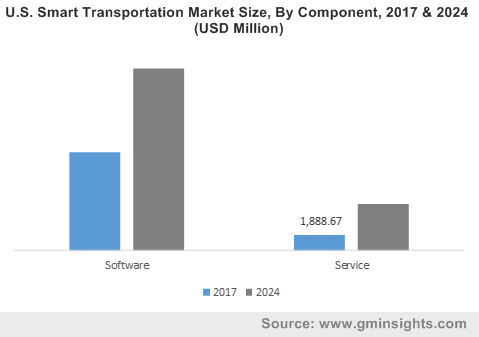Smart transportation market to register a humongous CAGR of 20% over 2018-2024, proactive government initiatives to propel industry expansion
Publisher : Fractovia | Published Date : May 2018Request Sample
Subject to the extensive and swift adoption of intelligent mobility solutions across major cities around the globe, smart transportation market has been treading along a lucrative growth path in the recent years. In addition to the advent of these smart technologies, a remarkable increase in governmental patronage and financial support toward revamping transportation industry can be accredited to the rapid progression of this business space. Indeed, it is being projected that smart transportation industry, which surpassed a total remuneration portfolio of about USD 41 billion in 2017, would establish itself as one of most profitable business verticals in the times to come.
Smart Transportation Market Size, By Mode of Transportation, 2017 & 2024 (USD Million)

Elaborating further, the robust penetration of smart technologies in the transit space coupled with the efforts being deployed by the overall automotive industry to manufacture innovative vehicles has consequentially propelled the market share. Moreover, it would be prudent to mention that numerous governments, particularly across the emerging economies, appear keen to invest massive amount of resources in developing smart cities.
How Smart Cities initiative will favorably impact smart transportation market trends in India
In a recent turn of events, Government of India has declared to construct 599 highway projects across the country under the ambitious Smart Cities program. With a total budgetary outlay of INR 108,000 crore, which would be spent over the period of 5 years, the project has already received INR 50,802 crore and an additional sum of INR 48,000 crore would be utilized for developing first 20 Smart cities. One of the foremost goals of the scheme is to provide efficient urban mobility and public transport system – a factor that would significantly bolster the growth prospects of industry in the nation.
Concurrently, the Indian Government has framed a National Electric Mobility Mission Plan 2020 which proposes to incentivize adoption of green vehicles and ramp up domestic manufacturing capability of automotive sector. This would warrant rapid adoption of intelligent traffic management and integrated multimodal transport solutions which would eventually have an optimistic influence on the market share expansion.
Dubai: Leading the proliferation of smart transportation industry across MEA region
Building on the legacy of innovative initiatives, Dubai has recently announced to have joined hands with the US based transportation solutions provider, Hyperloop One Inc. Reportedly, the objective of this alliance is to harness the prowess of groundbreaking transport technologies, transform the conventional idea of mobility, and assist Dubai in reinforcing its reputation as the chief hub of global trade and tourism.
For the record, Hyperloop is a proposed mode of freight and passenger transportation that would apparently propel a pod-like vehicle through a reduced pressure tube with a speed more than that of an airliner. With the emergence of such progressive technologies, the smart transportation market is on the cusp of witnessing a paradigm shift of sorts in the times to come.
In yet another instance, the Roads and Transport Authority (RTA) of Dubai has recently declared a new smart transport strategy 2017-2021, which intends to transform 25 percent of the city’s road trips into autonomous by the year 2030. The initiative further aims to execute 34 projects ranging from self-driving buses, autonomous drones, and taxis as well as other tasks such as expansion of information kiosks and pedestrian crossings. With the unveiling of such pathbreaking projects, the industry share is bound to advance at an exceptional pace over the ensuing years.
China: A pivotal contributor toward global smart transportation industry share augmentation
Touted as the largest automobile market across the globe, China has made swift headways in enhancing the overall growth potential of industry in the recent years. For instance, the Intelligent Transport System Association of China has recently announced to invest about USD 30 billion in the intelligent transport solutions sector by 2020 that would aid in encouraging green transport system and help construct electronic charging systems across the country.
Speaking on the similar lines, the Chinese Government aims to have 10 percent of all cars to be self-driving by 2030. Subsequently, the market players consider this opportunity as significant and intend to release unique solutions that would assist in delivering better traffic updates, on-the-go recharging of electric-vehicle batteries, more accurate mapping, etc. One of the most interesting instances of this is the trial of ‘intelligent highway’ that could revolutionize the global smart transportation market outlook. Apparently, the highway would be embedded underneath with advanced technologies and solar panels that would generate enough electricity to power approximately 800 homes and highway lights.
Apart from such proactive schemes, China has established a national motor vehicle and driver information management system and further plans to set up a platform for national electronic charging systems. There are also various efforts in pipeline to promote information-sharing activities between civil aviation, rails, buses which would achieve seamless integration of data, in turn opening plethora of opportunities for industry stakeholders.
Owing to the development of autonomous vehicles and high-penetration of ride-hailing services, smart transportation market is set to undergo a massive transformation in the forthcoming years. As per a research report compiled by Global Market Insights, Inc., the overall smart transportation industry is forecast to clock in a y-o-y growth rate of an impressive 20% over 2018-2024. The enormous numbers also underline the fundamental altercation that the automotive & transportation space would witness in its entirety in the ensuing years.